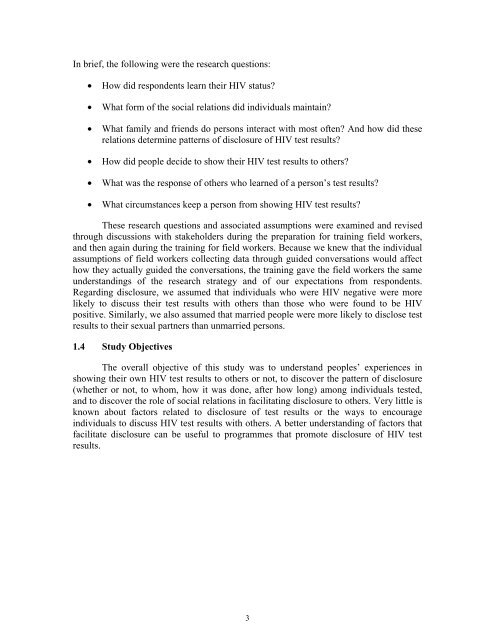social context of disclosing hiv test results: hiv testing in tanzania
social context of disclosing hiv test results: hiv testing in tanzania
social context of disclosing hiv test results: hiv testing in tanzania
You also want an ePaper? Increase the reach of your titles
YUMPU automatically turns print PDFs into web optimized ePapers that Google loves.
In brief, the follow<strong>in</strong>g were the research questions:<br />
• How did respondents learn their HIV status?<br />
• What form <strong>of</strong> the <strong>social</strong> relations did <strong>in</strong>dividuals ma<strong>in</strong>ta<strong>in</strong>?<br />
• What family and friends do persons <strong>in</strong>teract with most <strong>of</strong>ten? And how did these<br />
relations determ<strong>in</strong>e patterns <strong>of</strong> disclosure <strong>of</strong> HIV <strong>test</strong> <strong>results</strong>?<br />
• How did people decide to show their HIV <strong>test</strong> <strong>results</strong> to others?<br />
• What was the response <strong>of</strong> others who learned <strong>of</strong> a person’s <strong>test</strong> <strong>results</strong>?<br />
• What circumstances keep a person from show<strong>in</strong>g HIV <strong>test</strong> <strong>results</strong>?<br />
These research questions and associated assumptions were exam<strong>in</strong>ed and revised<br />
through discussions with stakeholders dur<strong>in</strong>g the preparation for tra<strong>in</strong><strong>in</strong>g field workers,<br />
and then aga<strong>in</strong> dur<strong>in</strong>g the tra<strong>in</strong><strong>in</strong>g for field workers. Because we knew that the <strong>in</strong>dividual<br />
assumptions <strong>of</strong> field workers collect<strong>in</strong>g data through guided conversations would affect<br />
how they actually guided the conversations, the tra<strong>in</strong><strong>in</strong>g gave the field workers the same<br />
understand<strong>in</strong>gs <strong>of</strong> the research strategy and <strong>of</strong> our expectations from respondents.<br />
Regard<strong>in</strong>g disclosure, we assumed that <strong>in</strong>dividuals who were HIV negative were more<br />
likely to discuss their <strong>test</strong> <strong>results</strong> with others than those who were found to be HIV<br />
positive. Similarly, we also assumed that married people were more likely to disclose <strong>test</strong><br />
<strong>results</strong> to their sexual partners than unmarried persons.<br />
1.4 Study Objectives<br />
The overall objective <strong>of</strong> this study was to understand peoples’ experiences <strong>in</strong><br />
show<strong>in</strong>g their own HIV <strong>test</strong> <strong>results</strong> to others or not, to discover the pattern <strong>of</strong> disclosure<br />
(whether or not, to whom, how it was done, after how long) among <strong>in</strong>dividuals <strong>test</strong>ed,<br />
and to discover the role <strong>of</strong> <strong>social</strong> relations <strong>in</strong> facilitat<strong>in</strong>g disclosure to others. Very little is<br />
known about factors related to disclosure <strong>of</strong> <strong>test</strong> <strong>results</strong> or the ways to encourage<br />
<strong>in</strong>dividuals to discuss HIV <strong>test</strong> <strong>results</strong> with others. A better understand<strong>in</strong>g <strong>of</strong> factors that<br />
facilitate disclosure can be useful to programmes that promote disclosure <strong>of</strong> HIV <strong>test</strong><br />
<strong>results</strong>.<br />
3

















